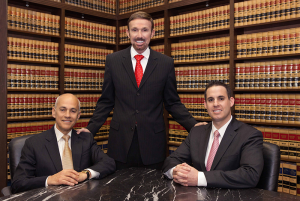Foreclosure Fraud Attorneys: California Civil Code 2945 – 2945.4
Owning a home and making mortgage payments can be easier said than done for some homeowners in California, especially in times when the real estate market experiences a downturn like that of the 2008 foreclosure crisis. The massive increase in foreclosures in California also led to an increase in a crime that is unique to real estate: foreclosure fraud.
Foreclosures are listed in public records, which means that this group of homeowners can easily be identified and targeted by “foreclosure consultants” offering false hopes of a way out of a desperate financial problem. To address this issue, the California legislature drafted and passed California Civil Codes 2945 – 2945.4, a set of statutes that define foreclosure fraud, create procedures for legitimate foreclosure consultations, and punishment for those who violate those procedures.
Who is a “Foreclosure Consultant?”

California foreclosure fraud laws are designed to prevent persons from acting as a “foreclosure consultant” to take advantage of distressed homeowners. Thus, a key provision of the law is that it applies only to those who are acting as a “foreclosure consultant.” According to Civil Code 2945.1(a), the term refers to any person who represents that, for a fee, they can perform any of the following services:
- Stop or postpone the foreclosure sale;
- Obtain any forbearance from any beneficiary or mortgagee;
- Assist the owner to exercise the right of reinstatement;
- Obtain any extension of the reinstatement period;
- Obtain any waiver of an acceleration clause contained in any promissory note or contract secured by a deed of trust or mortgage on a residence in foreclosure or contained that deed of trust or mortgage;
- Assist the owner to obtain a loan or advance of funds;
- Avoid or ameliorate the impairment of the owner’s credit resulting from the recording of a notice of default or the conduct of a foreclosure sale;
- Save the owner’s residence from foreclosure; or
- Assist the owner in obtaining from the beneficiary, mortgagee, trustee under a power of sale, or counsel for the beneficiary, mortgagee, or trustee, the remaining proceeds from the foreclosure sale of the owner’s residence. 1
Note, this definition is applied to both those who provide legitimate foreclosure advisory services as well as those who do so for a fraudulent purpose. It is only if the foreclosure consultant fails to follow the legal procedures for engaging in this business that he or she can become entangled in a criminal case.
What is Foreclosure Fraud?
Under Civil Code 2945.4, it is a crime to do any of the following acts in a capacity as a foreclosure consultant:
- Charging or collecting any compensation until after the foreclosure consultant’s work has been completed as agreed to in the contract;
- Charging or collecting interest or fees in excess of 10% per year of any loan the foreclosure consultant may make to the owner;
- Taking an interest in other property or a lien against the wages of the owner;
- Receiving payments from any third party for these services without full disclosure to the owner;
- Acquiring any interest in the owner’s residence in foreclosure;
- Taking any power of attorney from an owner for any purpose;
- Inducing or attempting to induce an owner into a contract that does not comply in all respects with Sections 2945.2 and 2945.3; or
- Entering into an agreement at any time to assist the owner in arranging, or arrange for the owner, the release of surplus funds after the trustee’s sale is conducted, whether the agreement involves direct payment, assignment, deed, power of attorney, assignment of claim from an owner to the foreclosure consultant or any person designated by the foreclosure consultant, or any other compensation. 2
Prosecution of Foreclosure Fraud Under Civil Code 2945.4
The crime of foreclosure fraud is similar to that of the crime of theft by false pretenses. A “false pretense” is any act, word, token, or symbol that is intended to deceive another person. In both crimes, the perpetrator intends to deprive the alleged victim of his or her property by tricking the victim into giving possession and ownership rights to that property to the perpetrator (or someone else). The property can be money, labor, personal property, or real property.

In order to be convicted of foreclosure fraud, the prosecution must prove beyond a reasonable doubt the following elements:
- You knowingly and intentionally deceived a property owner (or the owner’s agent) by fraudulent representation or false pretense;
- You did so intending to persuade the owner/agent to let the you (or another person) take possession and ownership of the property; AND
- The owner/agent let you (or another person) take possession and ownership of the property because he or she relied on the representation or pretense.
In order to prove the element of false pretense, the jury must find that one or more of the following is true:
(A) Either a false writing or false token accompanied the false pretense;
(B) There was a note or memorandum of the pretense signed or handwritten by you; OR
(C) Testimony from two witnesses or testimony from a single witness along with other evidence supports the conclusion that you made the pretense. 3
Punishment for Foreclosure Fraud
Violations of Civil Code 2945.4 are “wobblers,” which means you can be charged with either a felony or misdemeanor. In the case of a felony, you face a sentence in county jail of 16 months, two or three years, and a fine of up to $10,000. If convicted of a misdemeanor, the same fine can be imposed, but the jail sentence can be no more than 364 days.
Additionally, there are sentence enhancements available to the court for crimes that exceed certain dollar amounts. If the homeowner was defrauded of more than $65,000, the court may add an additional sentence of one to four years in state prison. 4 If the homeowner was deprived of more than $100,000, and you were also convicted of two or more felonies in the same criminal proceeding, the sentence may be increased by up to five additional years, and a fine of either $500,000 or double the amount that was taken (whichever is greater) may be imposed. 5
Finally, the court may also order restitution to be paid to the victim, and if you have a professional license (such as a real estate broker or an attorney), you may be subject to additional sanctions from the licensing board, including suspension or revocation of your license.
Possible Defenses Against Foreclosure Fraud Charges
A skilled attorney may be able to raise several defense on your behalf in order to get the best possible results in your case. These may include:
You acted in good faith. In other words, you made reasonable efforts to deliver on the services for which you were to be paid. A good faith effort that is unsuccessful is not necessarily behavior that could lead to a criminal conviction. The prosecution may not rely solely on the fact that you ultimately failed in your efforts to delay or stop the foreclosure process on behalf of a client.

Lack of intent. If you did not intend to deceive the client in any way, you should not be convicted of this crime. Suppose you are an attorney with a track record for helping clients with their foreclosure settlements, and you have instructed a client who is in foreclosure to follow a set of procedures that would ultimately result in either a delay or a halt to the foreclosure, but he or she neglected to follow any of them. In doing so, you had no intention to deceive the client into following bad advice that had no chance of succeeding. He or she must provide proof that you intended to deceive the client or otherwise did not intend to deliver what you promised.
Lack of evidence. Your attorney can challenge the evidence presented by the prosecution. For example, if the prosecution cannot produce a single document that is signed by you and that you knew to be false, your attorney may challenge the validity of the prosecution’s case. If the evidence is obtained illegally, a skilled and experienced attorney will know how to use the rules of evidence to prevent the prosecution from using certain evidence against you at trial.
Frequently Asked Questions Regarding Foreclosure Fraud
At Wallin & Klarich, we frequently receive questions from those facing foreclosure fraud charges. These include:
1. Are there any requirements to becoming a foreclosure consultant?
Yes. As of 2009, California requires all foreclosure consultants to register with the Secretary of State’s office. 6 The applicant must provide his or her personal information, evidence of a $100,000 bond, and copies of all advertising and contracts that the applicant will be using in the course of business. Once those criteria are met, the state will issue a Certificate of Registration.
2. What if I did not register as a consultant with the Secretary of State?
Working as a foreclosure consultant without first receiving a Certificate of Registration is a crime in itself. The failure to register could lead to a fine of $25,000 and up to 364 days in county jail. 7
3. Is it legal to get an advance fee for foreclosure consulting?
Generally, the laws against foreclosure fraud prohibit the collecting of any compensation or fees before the work has been done. However, there is an exception process for attorneys and real estate brokers who submit the advance fee agreement to the Department of Real Estate. If approved, the attorney or real estate broker may collect advance fees pursuant to the contract with the client.
Call Wallin & Klarich Today If You Are Facing Charges of Foreclosure Fraud

If you are facing charges of foreclosure fraud, you will need an aggressive and experienced attorney to defend you. That is why you should contact the criminal defense attorneys at Wallin & Klarich as soon as possible. Our attorneys have over 40 years of experience defending those facing criminal fraud charges. We can help you, too.
With offices in Los Angeles, Sherman Oaks, Torrance, Tustin, San Diego, Riverside, San Bernardino, Ventura, West Covina and Victorville, there is a Wallin & Klarich attorney experienced in defending those facing foreclosure fraud charges near you, no matter where you work or live.
Call us today at (877) 4-NO-JAIL or (877) 466-5245 for a free phone consultation. We will get through this together.
1. [Cal. Civ. Code § 2945.1(a)]↩
2. [See Cal. Civ. Code § 2945.4.]↩
3. [See CALCRIM 1804. Theft by False Pretense (Pen. Code, § 484).]↩
4. [See Cal. Pen. Code § 12022.6.]↩
5. [See Cal. Pen. Code § 186.11.]↩
6. [See Cal. Civ. Code § 2945.45]↩
7. [Brown Directs Foreclosure Consultants to Register with his Office and Post $100,000 Bond,” Office of the Attorney General of California (Press release), June 1, 2009, available at http://oag.ca.gov/news/press-releases/brown-directs-foreclosure-consultants-register-his-office-and-post-100000-bond.]↩

